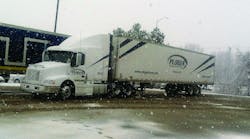For smaller fleets, the benefits of technology are sometimes lost because of the added costs. In some cases, though, the benefits are simply too great to ignore.
That is the case for Ploger Transportation. The fleet of about 30 trucks was chosen to test Volvo Trucks’ adaptive loading system two years ago.
“Our focus is on gaining greater efficiency, because small carriers like us have no economies of scale,” explained Joel Morrow, vice president of procurement for Ploger Transportation, a Bellevue, OH-based fleet founded by Joel and his brother Jerry in 2006.
The fleet is made up primarily of Volvo VNM models. Most are 6x2 tractors in tag axle configuration; six feature Volvo’s adaptive loading.
The adaptive loading system works by combining a 6x2 liftable forward axle that was designed in partnership with Link Manufacturing. The OEM’s electronically controlled suspension technology helps to distribute load weight without the internal gearing of a drive axle, thereby lowering weight and reducing internal friction.
The system automatically lifts the axle in empty or light-load situations based on preprogrammed weight thresholds, creating a 4x2 configuration. This helps reduce rolling resistance from tires and generates fuel savings. The added benefit of fewer gearing drives further reduces weight by more than 300 lbs. over a traditional 6x4 axle configuration.
Morrow drives 150,000 mi. a year hauling mostly high-end furniture for boutique dealers in 53-ft. dry van trailers. He began driving a Volvo VNM model tractor equipped with the adaptive loading system back in July 2013. To date, he has put more than 470,000 mi. on it.
Morrow said the adaptive loading package has also boosted productivity by 20%. He and several other Ploger drivers operating trucks equipped with the system found they could hook and unhook from trailers faster, didn’t get stuck in snow due to traction improvements from the system, and saved about $11,000 in fuel costs.
“Our testing found adaptive loading to be a positive across the board in terms of fuel efficiency, better handling and traction, plus improved tire wear characteristics,” Morrow says. “We’ve actually been able to get up to 265,000 mi. on some of our steer tires due to the new system.”
Morrow adds that he thinks the fleet can sustain 10 mpg on tractors equipped with the system.
According to Volvo, fleets that traditionally go out heavy and return light can see similar benefits with adaptive loading. “Trucking applications that go out fully loaded and return empty traditionally have had to spec equipment to accommodate maximum loads even though they don’t need those specs for half the miles they run,” Wade Long, Volvo Trucks product marketing director, says. “With adaptive loading, those customers can reduce fuel and maintenance costs by operating a different configuration when empty or lightly loaded.”
Volvo said full production of the system is set for January. The adaptive loading package can only be ordered in combination with certain specs, including Volvo’s I-Shift automated mechanical transmission, either a 405 hp. D11 or 425 hp. D13 engine, 12,500- to 14,000-lb. front axle, and 20,000-lb. liftable axle.
The system can be integrated with several other Volvo packages such as its XE Economy, XE Adaptive Gearing, and Eco-Torque fuel-saving specs.



